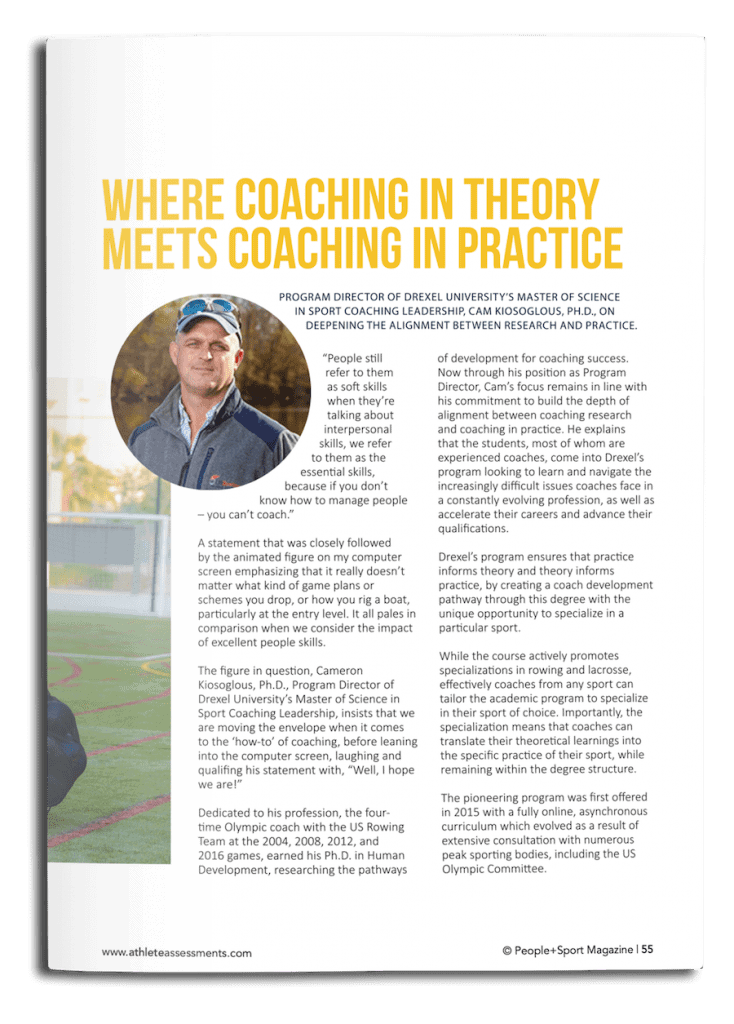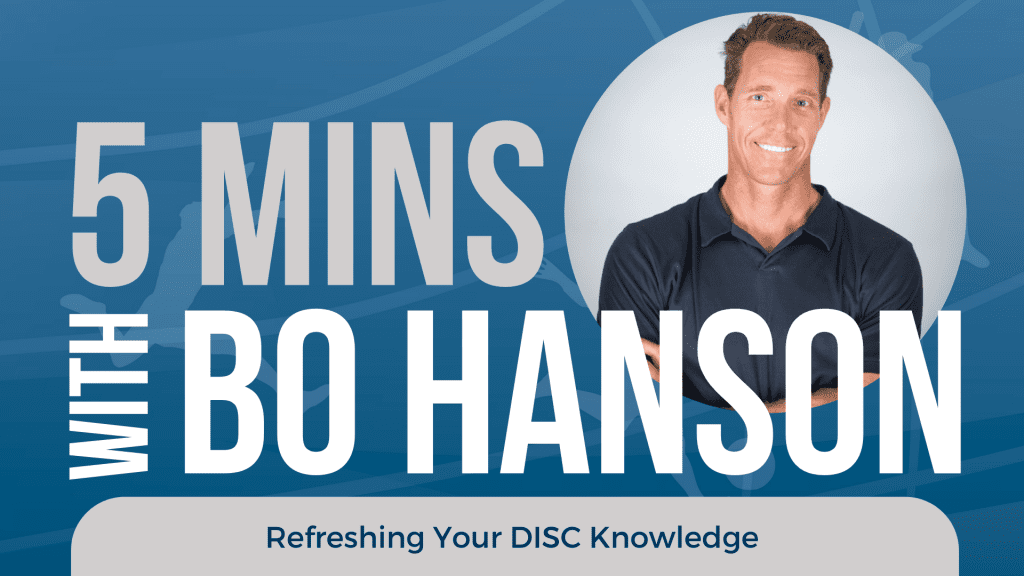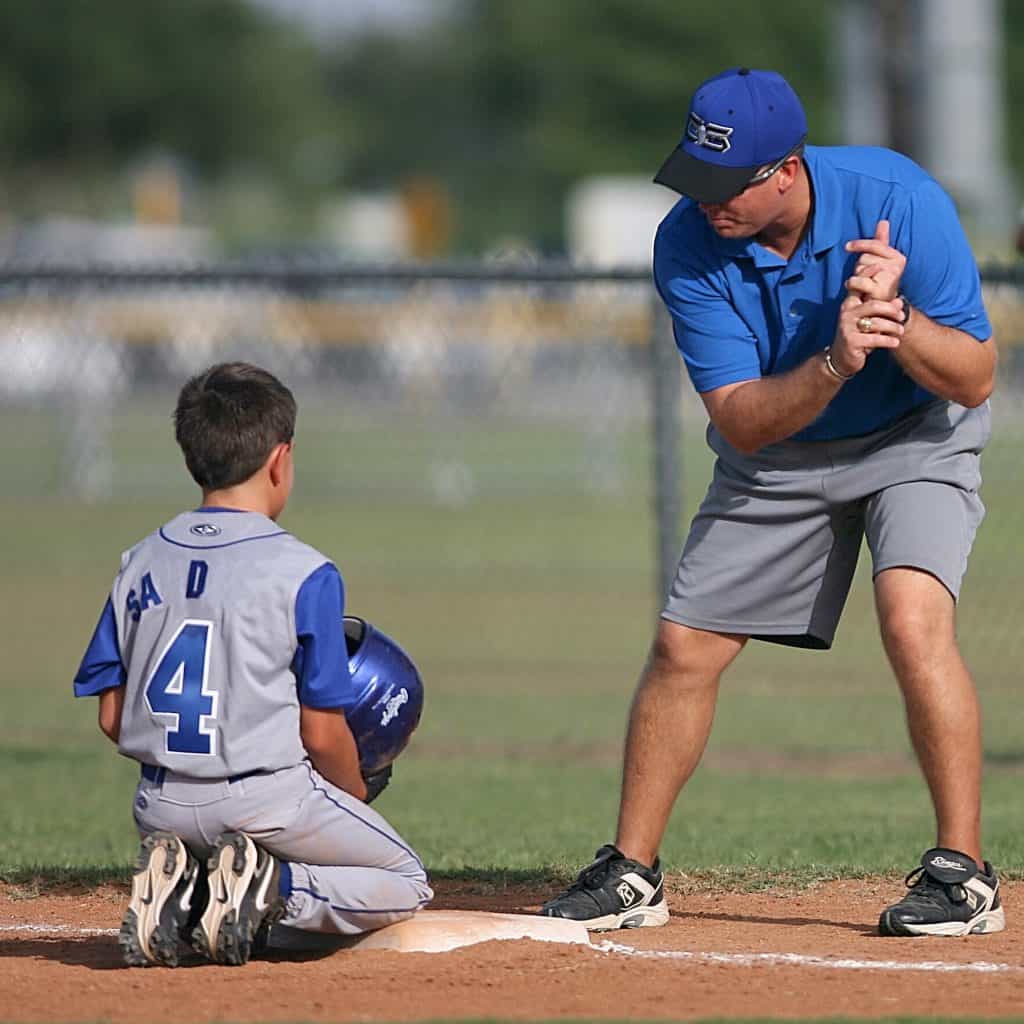“People still refer to them as soft skills when they’re talking about interpersonal skills, we refer to them as the essential skills, because, if you don’t know how to manage people – you can’t coach.”
- Cameron Kiosoglous, Ph.D.
A statement that was closely followed by the animated figure on my computer screen emphasizing that it really doesn’t matter what kind of game plans or schemes you drop, or how you rig a boat, particularly at the entry level. It all pales in comparison when we consider the impact of excellent people skills.
The figure in question, Cameron Kiosoglous, Ph.D., Program Director of Drexel University’s Master of Science in Sport Coaching Leadership, insists that we are moving the envelope when it comes to the ‘how-to’ of coaching, before leaning into the computer screen, laughing and qualifing his statement with, “Well, I hope we are!”
Dedicated to his profession, the four-time Olympic coach with the US Rowing Team at the 2004, 2008, 2012, and 2016 games, earned his Ph.D. in Human Development, researching the pathways of development for coaching success. Now through his position as Program Director, Cam’s focus remains in line with his commitment to build the depth of alignment between coaching research and coaching in practice. He explains that the students, most of whom are experienced coaches, come into Drexel’s program looking to learn and navigate the increasingly difficult issues coaches face in a constantly evolving profession, as well as accelerate their careers and advance their qualifications.

Drexel’s program ensures that practice informs theory and theory informs practice, by creating a coach development pathway through this degree with the unique opportunity to specialize in a particular sport. While the course actively promotes specializations in rowing and lacrosse, effectively coaches from any sport can tailor the academic program to specialize in their sport of choice. Importantly, the specialization means that coaches can translate their theoretical learnings into the specific practice of their sport, while remaining within the degree structure.
The pioneering program was first offered in 2015 with a fully online, asynchronous curriculum which evolved as a result of extensive consultation with numerous peak sporting bodies, including the US Olympic Committee.
Drexel’s program also intertwines students at certificate, Master’s, and Doctoric levels, with core courses like ‘The Foundations of Coaching’ being common to coaches studying at all levels. In order to enhance the program’s accessibility, the team who designed it ensured that courses are offered at a shorter, certificate level. Plus not only does the course put people together who are at different stages of their academic career, it also combines coaches from different sports and all different levels, adding “Conversations between coaches coaching at different levels – high school, master’s, elementary, collegiate, Olympic – highlight that coaching is coaching, is coaching, is coaching.”
He also shared,
“A collegiate coach can learn so much from a high school coach. The misperception is that the cutting edge is elite sport, it’s not, it’s the other way around! Those young athletes are figuring out what they’re doing and as they go through the system, they have more impact on change, rather than a duplication of the elite athlete and how that trickles the other way.”
Cam explained the way they work with each coach to ensure they can tailor their experience and identify any areas that they need to work on, whether that’s through sport specialization or customizing the science or management content. Additionally, he explained that universally all sports want their coaches to have increased leadership, management, and administration skills.
Drexel’s program is also differentiated by its study abroad component, with students in previous years having the opportunity to study coaching in Italy.
However, the pandemic has only highlighted the need for online and remote learning, with Cam also saying, “In online learning, coaches are able to get on the ground and test out what they’re learning immediately. They click off a call and straight away, go and try it out.”
Even though courses are tailored to meet the needs of each coach, the development of self-awareness is a core foundation for all students in Drexel’s Sport Coaching Leadership Master’s program. Self-awareness underlines all subjects, but there are also tools and a specific subject dedicated to the development of self-knowledge and your personal coaching style.
To facilitate an awareness, understanding, and application of each student’s coaching style, the Drexel Program calls on the expertise of specialists in the ‘people side of sport’, Athlete Assessments.
But the respect is mutual with CEO of Athlete Assessments, Liz Masen saying that her biggest admiration of the program is every one of their staff, lecturers, and students, are genuinely passionate about coaching. She added,
“They have committed to their development, and actively engage to learn more, find out more, and add to their tool kit of coaching strategies. The response to the CoachDISC Profile is consistently valuable, irrespective of the level of coach, and makes for some active discussions.”
In preparation for the guest lecture delivered by one of our team at Athlete Assessments, students take the 12-minute online survey which generates a 40-page CoachDISC Profile Report detailing each individual’s personal coaching style, strengths, communication preferences, and areas for improvement. There is no right or wrong CoachDISC Profile, only the identification of natural or preferred behaviors within a coaching context. The students get an insight into the way they coach, communicate, build relationships, approach tasks, and the pace they prefer to operate at. Importantly, the CoachDISC Profile also provides information detailing environments that the individual performs best in and what they are likely to do in stressful situations allowing them to prepare strategies in advance to adapt and achieve the best possible outcome.
Linking self-awareness and the increase in people and communication skills, Cam explained that instead of course conversations focusing on the technical and tactical like, ‘what’s my strategy in the last two minutes of the game’, or ‘where should I put my best player’; the dialogue has moved to focusing on why it’s important to have that conversation, when to have it, and how to have it.
Drexel’s program transcends typical online learning and coach development as students specialize in higher education, leadership and decision-making skills, the psychology of mind-brain learning, creativity, and innovation. Cam explained that they want graduates to be able to use what they learn in the course, but also there should be no transition when they apply the skills in the workplace.
While Drexel’s Sport Coaching Leadership Master’s program facilitates lots of different pathways; for example, some students are coaching at a high school level and want to break into the collegiate level as a head or assistant coach, while some want to focus on operations and recruiting.
Cam explained,
“Within six months graduates are finding new positions, whether that’s in leadership or administration, they are diversifying and increasing what they’re able to do in their roles, and generally becoming more valuable to their employers.”
Drexel’s program takes a holistic perspective on the role of the coach and the profession of coaching, Cam described the way the sports community is entering into a second-generation way of thinking saying,
“The profession is evolving, we are no longer talking about sport psychology but mental health, we are no longer talking about physical education, we’re talking about physical literacy.”
But Cam also shared that with the increasing professionalization of coaching comes a greater expectation from employers that coaches have a postgraduate qualification in coaching,
“When it comes to our students, it’s more than just an employer expectation, because even though our coaches come from all different sports and they coach at all different levels, they all unanimously have the drive to be better at what they do.”
Throughout their program students are exposed to a deep investigation of the issues, strategies, and solutions surrounding things like; long term athlete development, diversity, equity and inclusion, and making sport more accessible to those who would never be exposed to sport.
While the International Council for Coaching Excellence, the US Olympic Committee, and Shape America (just to name a few), working in conjunction with sports specific organizations and the standards they support have made significant inroads towards the professionalization of coaching, still the diversity of participation is not reflected in leadership and administration, particularly with women.
Cam concluded,
“So how do we get the right people for the right jobs and how do we lower the barriers to participation within sport? These questions are challenging all sports and the responsibility for their answers falls increasingly to coaches.”
LOVE THIS ARTICLE?
DOWNLOAD YOUR FREE, PRINTABLE PDF COPY BY FILLING OUT THE FORM BELOW!

Where to from here?
Stay informed and stay current by reading from our extensive online library of free resources, because regardless of your role, whether you’re a coach, consultant, sport psychologist, academic, or administrator, your people rely on you to bring them the latest and most effective tools and knowledge available on the market. If there is anything we can help you with, or give you more information on, just reach out and contact us.
Recommended Articles
In line with the release of our new look DISC reports, we wanted to provide a refresher on the history of DISC and basics of each profile. Bo talks about where it began, why it’s important, and the value in knowing your own profile and preferred behaviors and even identifying that of others.
Let me ask you the most important of coaching questions, “What style of coach are you?” As coaches we occupy a special, even privileged place in our athletes’ lives. On the surface, we are just a part of their athletic journey, but really, we often spend as much, if not more time with our athletes, than their family and close friends.
Recently published research out of Queensland University of Technology proves that it’s possible, plausible, believable and appropriate, to adapt your behavior to suit the situation. Importantly, the research shows that the momentary adaptations have no negative impact or consequences for the individual.





